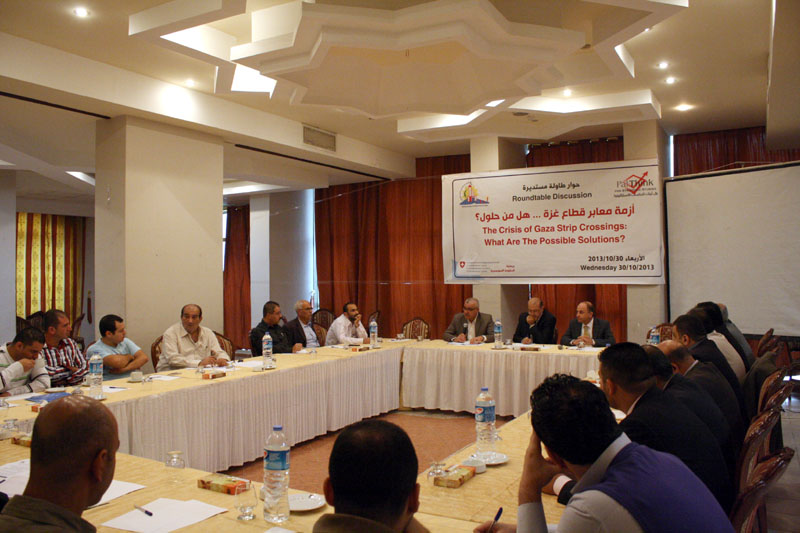Gaza City (October 30th, 2013) – As the crises of the Gaza Strip crossings remain, and as the suffering of the people and economy of Gaza continues, whether by preventing people from traveling to and from the Strip, or through preventing goods and supplies from entering and existing without restrictions, Pal-Think for Strategic Studies expresses its grave concern over this growing suffering, and urges all stakeholders to stick to their responsibilities and do something to put an end to this problem. From that stand, and as a first positive step towards bringing this issue to the front spot, by giving it a more serious attention, Pal-Think, in cooperation with the Union of Palestinian Contractors, held a round table discussion with a number of Palestinian stakeholders, members of legislative counsel, representatives from the Ministry of Agriculture and the Crossings Management Authority, as well as with representatives from the civil society and the privet sector, to brainstorm and discus the crises of Gaza Strip crossings, in order to find alternative possible solutions.
The discussion aimed at focusing on the future by finding workable solutions for both, the short and the long run, and which are in line with the higher Palestinian interests and the international laws. From this perspective, participants in the discussion emphasized that achieving national reconciliation and lifting the Israeli blockade on the Gaza Strip are the best ways to fully resolve the crossings crisis. In the mean time, they also assured the need to put the Palestinian national interest above any partisan interests, and to avoid partisanship when it comes to the crossings case. Building a cooperative relationship between both governments in Gaza and the West Bank, in the area of crossings management is possible and very essential step towards achieving national reconciliation. It has happened in the education and health sectors and it can happen any other sector, as long as there is true well.
In the end of event, participants final recommendation included the following:
• Explore the possibility of modifying and implementing the 2005 Crossings Agreement with all of its clauses, including running the Rafah crossing, operating the safe passage between Gaza and the West Bank and the rebuilding of the Gaza International Airport and the Gaza seaport.
• Urge the international community to continue its efforts in this area by working on opening the seven Gaza crossings and by putting pressure on Israel to end its land, air and sea siege on Gaza.
• Communicating with the Egyptian government through a selected Palestinian popular delegation to find solutions for the Rafah crossing problem, away from any political disputes, and to emphasize the on the strategic Egyptian-Palestinian relationship.
• Re-activating the treaties signed by the Palestinian Authority and Egypt, in the era of the late President Yasser Arafat, which call for strengthening bilateral trade and implementing free trade agreement.
• The need to remove the crossings case from the circle of political competition between parties of the division and to keep it away from any regional political or security fluctuations.
• Demanding the government in Gaza to take more flexible positions regarding the management of the crossings, and to allow for a broader community participation in this area, for the benefit and in the interest of the people.
• Demand the Palestinian Authority to activate its role in this area through including the case of lifting the siege on Gaza on its negotiations agenda with the Israelis.


